- Home
- Tarryn Fisher
The Wrong Family Page 26
The Wrong Family Read online
Page 26
And finally, to my aunt Marlene Groenewald, who told me a version of this story twenty years ago. I think of you every day. This book would not exist without you. I love you so much and I miss you. Tell Dad I said hi.
The
Wrong
Family
Tarryn Fisher
Reader’s Guide
Discussion Questions
Motherhood is a theme that runs through this whole book: Winnie’s relationship to Sam, Juno’s relationship with her own estranged sons, Juno’s relationship to Sam, and, of course, Josalyn’s role as a mother and Winnie’s interference in that. As a society, how do we judge mothers who we perceive have made mistakes, and how does the role of motherhood in this book reflect that?
Winnie is a complicated character who doesn’t always behave well or do the right thing. Did you feel sympathy for Winnie, even after you discovered the full truth about her? Why or why not?
How does Winnie’s need to control things around her, especially her family life, backfire on her?
Nigel is clearly unhappy in his marriage. Why do you think he stays?
While Juno isn’t perfect, her situation is created by a lot of systemic inequality regarding mental health, physical health, housing needs, and the prison system. How do you think real people are disenfranchised by these systems? Do you think everyone who might be disempowered by these systems is disempowered in the same ways? How difficult would it be for someone like Juno to get back on her feet?
Why do you think the Straub family denied to themselves that Dakota needed some serious mental health assistance? Why do you think that this kind of issue goes undiagnosed? What advantages does Dakota have that others who struggle with mental health might not have? Discuss the mental health struggles that Dakota, Juno, and Josalyn have, respectively. How differently did their situations turn out, and why do you think that is?
Juno has some definitive thoughts about Winnie and the Crouches’ marriage. Do you agree with the opinions she has formed? Why or why not?
Why do you think Juno chooses to stay in the crawl space? What options do you think she has, if any?
Discuss the ways in which privilege functions for the characters in this novel.
In many ways, Winnie is performing the perfect family life she wants to have, even though her performance is designed to hide a terrible secret. In what ways do we perform in our own lives, and in what ways does society pressure and prompt us to do that?
The Wrong Family Author Q & A
What was your inspiration for The Wrong Family? Did it start with the idea of a troubled marriage, or did it start with the crawl space?
When I was fifteen, my aunt Marlene, who was visiting from South Africa at the time, told me a story about a couple in her city. In short: they’d found a squatter living in their closet, and the squatter had been there for months. I was less mortified than I was intrigued. What a great idea! Sneak into someone’s house and live there without them knowing! I wanted to be the squatter; I wanted to spy on the couple. I wanted to know what she saw and how involved she was in their lives. The story stuck with me and over the next twenty years I’d find myself revisiting the couple and their squatter until I decided to sit down and meet them. I did so in my mind, and I did not get what I was expecting.
What draws you to write about a complicated—maybe even doomed—marriage? Or family dynamics more generally?
I’m an introspective person. When I began writing seriously in my early twenties, I was exploring myself and my personality in a fictional world. I took my issues and my questions and my trauma to stories where I dressed them in characters and scenes. When I ran out of personal issues to write about, I began exploring human issues in general. Why do we do the things we do? Some authors write to beautify the world; I write to expose things in the crumbling of it.
How did you develop the character of Juno?
When I first moved to Seattle, I’d often write in coffee shops downtown. I befriended a handful of homeless men in the area who’d come sit at my table and chat with me. I met a homeless engineer, a homeless mechanic, a homeless musician, and a homeless vet during the three years I spent in the area. Their stories were told with painful remorse as they would recount the one mistake that derailed their lives. Juno mostly developed herself from those stories. I could hear those men in my head as I wrote about her. I knew she had to be desperate and I knew she wanted to make things right.
Juno’s and Winnie’s voices are so different, and yet they struggle with some of the same issues. Did one of them come more easily to you? Was one more of a challenge? What similarities do you see between Winnie and Juno? Might we say that they represent two directions stemming from the same forked path?
Winnie and Juno: different voices, same issues. They were separated by age and economics and yet they shared so many similarities. Juno was hiding in a crawl space; Winnie was hiding in her pretty house. One wanted to make amends for what she’d done and the other one wanted to forget what she’d done entirely. In the end, both were seeking peace, and they were both too dishonest about themselves to ever find it.
What comes first for you—the overall idea for the book or a character?
I ask what-if questions about myself and then seek to answer them. What if your husband had two other wives...? What if you were homeless...? What if you snapped and became a serial killer...? What if someone kidnapped you and locked you in a cabin? I’ve written all those stories because I wanted to read them. The characters show up at their leisure and I don’t always like them. But I always listen and tell their truth.
One of the great ironies of this story is that Winnie works in mental health but can’t see how deep her own brother’s struggles are, and Juno also worked in mental health but can’t see her own diagnosis. Was that irony deliberate, something you wove in from the beginning, or was it something that developed organically and perhaps even unconsciously as you wrote?
I think that it is a human issue. We see what we are comfortable seeing and shade our eyes to the rest. Winnie and Juno are both very selfish and self-involved individuals. They might work in an occupation that aids people, but they look to help themselves first. I think they’re both addicted to how doing good makes them feel, but in the end it’s still about their feelings.
A similar question: this book touches on a lot of important and deeply relevant social issues. Mental health, homelessness, incarceration—the book shows us how someone can be affected by any or all these things, and that people’s situations are rarely simple. Was it your intent to write about those things, or did the characters and the story reveal themselves to you as you went?
I worked in mental health and those experiences definitely shaped me as a writer. What I’ve found about people in general is that they rarely try to understand their personal antagonist. When you put a face and a past and a trauma on your enemy, you are given understanding which is a powerful avenue for growth. So I want to write about the complicated things that we do to each other and give insight into why we do them.
What other writers are you loving lately? Any thriller writers you’re into or any other genres?
I’ve been reading BIPOC authors this year. I was blown away by the compact art in My Sister, the Serial Killer by Oyinkan Braithwaite. I still think about that book every day. I could not accomplish what Oyinkan did in that book; she told a complex story with few words and it was powerful. Mexican Gothic by Silvia Moreno-Garcia was a favorite this year—let’s go, women who write horror! And I would highly, highly recommend The Girl with the Louding Voice by Abi Daré. I’m not sure there’s been another book in my lifetime that has made me feel so many things.
Do you have any must-have routines or rituals as a writer that help you focus?
There are things I can’t have: obligations. Obligations crush any desire to create. If I know I have to be somewhere
or do something, I can’t focus. I need to be able to wander in and out of my office at leisure to type a hundred words here or there, and I need to know I don’t have anywhere else to be. So when I dive into a book, I become largely unsocial and unresponsive to friends and events. I guess that’s how writers end up alone.
Can you tell us anything about what you’re working on next?
Yes, it’s going to be another unique story line, but this one is less cerebral than The Wives and The Wrong Family. It’s instinctive and fast-paced—visceral.
I’m writing about a hunted woman who is hiding in plain sight. If you hunt a woman for long enough, she will evolve to be the stronger thing. My new character is the badass we need right now.
The Wives
by Tarryn Fisher
1
He comes over on Thursday every week. That’s my day, I’m Thursday. It’s a hopeful day, lost in the middle of the more important days; not the beginning or the end, but a stop. An appetizer to the weekend. Sometimes I wonder about the other days and if they wonder about me. That’s how women are, right? Always wondering about each other—curiosity and spite curdling together in little emotional puddles. Little good that does; if you wonder too hard, you’ll get everything wrong.
I set the table for two. I’m a little buzzed as I lay out the silverware, pausing to consider the etiquette of what goes where. I run my tongue along my teeth and shake my head. I’m being silly; it’s just me and Seth tonight—an at-home date. Not that there’s anything else—we don’t do regular dates very often at the risk of being seen. Imagine that...not wanting to be seen with your husband. Or your husband not wanting to be seen with you. The vodka I sipped earlier has warmed me, made my limbs loose and careless. I almost knock over the vase of flowers as I place a fork next to a plate: a bouquet of the palest pink roses. I chose them for their sexual innuendo because when you’re in a position like mine, being on top of your sexual game is of the utmost importance. Look at these delicate, pink petals. Do they make you think of my clit? Good!
To the right of the vaginal flowers sit two white candles in silver candlestick holders. My mother once told me that under the flickering light of a candle flame, a woman can almost look ten years younger. My mother cared about those things. Every six weeks a doctor slid a needle into her forehead, pumping thirty cc’s of Botox into her dermis. She had a subscription to every glossy fashion magazine you could name and collected books on how to keep your husband. No one tries that hard to keep their husband unless they’ve already lost him. I used to think her shallow, back when my ideals were untainted by reality. I had big plans to be anything but my mother: to be loved, to be successful, to make beautiful children. But the truth is that the heart’s desire is a mere current against the tide of nurture and nature. You can spend your whole life swimming against it and eventually you’ll get tired and the current of genes and upbringing will pull you under. I became a lot like her and a little bit like me.
I roll the wheel of the lighter with my thumb and hold the flame above the wick. The lighter is a Zippo, the worn remnants of a Union Jack flag on the casing. The flickering tongue reminds me of my brief stint with smoking. To look cool, mostly—I never inhaled, but I lived to see that glowing cherry at my fingertips. My parents bought the candleholders for me as a housewarming gift after I saw them in a Tiffany’s catalog. I found them to be predictably classy. When you’re newly married, you see a pair of candlestick holders and imagine a lifetime of roast dinners that will go along with them. Dinners much like the one we’re having tonight. My life is almost perfect.
I glance out the bay window as I fold the napkins, the view of the park spread out beneath me. It’s gray outside, typical of Seattle. The view of the park is why I chose this particular unit instead of the much larger, nicer unit overlooking Elliott Bay. While most people would have chosen the view of the water, I prefer a view of people’s lives. A silver-haired couple sits on a bench, staring out at the pathway where cyclists and joggers pass every few minutes. They’re not touching, though their heads move in unison whenever someone goes by. I wonder if that will be Seth and me one day, and then my cheeks warm as I think of the others. Imagining what the future holds proves difficult when factoring in two other women who share your husband.
I set out the bottle of pinot grigio that I chose from the market earlier today. The label is boring, not something that catches the eye, but the austere-looking man who sold it to me had described its taste in great detail, rubbing his fingers together as he spoke. I can’t recall what he’d said, even though it was only a few hours ago. I’d been distracted, focused on the task of collecting ingredients. Cooking, my mother taught me, is the only good way to be a wife.
Standing back, I examine my work. Overall, it’s an impressive table, but I am queen of presentation, after all. Everything is just right, the way he likes it, and thus, the way I like it. It’s not that I don’t have a personality; it’s just that everything I am is reserved for him. As it should be.
At six o’clock sharp, I hear the key turn in the lock and then the whistle of the door opening. I hear the click as it closes, and his keys hitting the table in the entryway. Seth is never late, and when you live a life as complicated as his, order is important. I smooth down the hair I so painstakingly curled and step from the kitchen into the hallway to greet him. He’s looking down at the mail in his hand, raindrops clinging to the tips of his hair.
“You got the mail! Thank you.” I’m embarrassed by the enthusiasm in my voice. It’s just the mail, for God’s sake.
He sets the pile down on the little marble table in the entryway, next to his keys, and smiles. There is a tilt in my belly, heat and a flurry of excitement. I step into the breadth of him, inhaling his scent, and burying my face in his neck. It’s a nice neck, tan and wide. It holds up a very good head of hair and a face that is traditionally handsome with the tiniest bit of roguish scruff. I nestle into him. Five days is a long time to go without the man you love. In my youth, I considered love a burden. How could you get anything done when you had to consider someone else every second of the day? When I met Seth, that all went out the window. I became my mother: doting, yielding, spread-eagle emotionally and sexually. It both thrilled and revolted me.
“I missed you,” I tell him.
I kiss the underside of his chin, then the tender spot beneath his ear, and then stand on my tiptoes to reach his mouth. I am thirsty for his attention and my kiss is aggressive and deep. He moans from the back of his throat, and his briefcase drops to the floor with a thud. He wraps his arms around me.
“That was a nice hello,” he says. Two of his fingers play the knobs of my spine like a saxophone. He massages them gently until I squirm closer.
“I’d give you a better one, but dinner is ready.”
His eyes become smoky, and I silently thrill. I turned him on in under two minutes. I want to say, Beat that, but to whom? Something uncoils in my stomach, a ribbon unrolling, unrolling. I try to catch it before it goes too far. Why do I always have to think of them? The key to making this work is not thinking of them.
“What did you make?” He unravels the scarf from his neck and loops it around mine, pulling me close and kissing me once more. His voice is warm against my cold trance, and I push my feelings aside, determined not to ruin our night together.
“Smells good.”
I smile and sashay into the dining room—a little hip to go with his dinner. I pause in the doorway to note his reaction to the table.
“You make everything beautiful.” He reaches for me, his strong, tanned hands tracked with veins, but I dance away, teasing. Behind him, the window is rinsed with rain. I glance over his shoulder—the couple on the bench are gone. What did they go home to? Chinese takeout...canned soup...?
I move on to the kitchen, making sure Seth’s eyes are on me. Experience has taught me that you can drag a man’s eyes if you move
the right way.
“A rack of lamb,” I call over my shoulder. “Couscous...”
He plucks the bottle of wine from the table, holding it by the neck and tilting it down to study the label. “This is a good wine.” Seth is not supposed to drink wine; he doesn’t with the others. Religious reasons. He makes an exception for me and I chalk it up to another one of my small victories. I have lured him into deep red, merlots and crisp chardonnays. We’ve kissed, and laughed, and fucked drunk. Only with me; he hasn’t done that with them.
Silly, I know. I chose this life and it’s not about competing, it’s about providing, but one can’t help but keep a tally when other women are involved.
When I return from the kitchen with dinner clutched between two dishtowels, he has poured the wine and is staring out the window while he sips. Beneath the twelfth-floor window, the city hums her nightly rhythm. A busy street cuts a path in front of the park. To the right of the park and just out of view is the Sound, dotted with sailboats and ferries in the summer, and masked with fog in the winter. From our bedroom window, you can see it—a wide expanse of standing and falling water. The perfect Seattle view.
“I don’t care about dinner,” he says. “I want you now.” His voice is commanding; Seth leaves little room for questions. It’s a trait that has served him well in all areas of his life.
I set the platters on the table, my appetite for one thing gone and replaced by another. I watch as he blows out the candles, never taking his eyes from me, and then I walk to the bedroom, reaching around and unzipping my dress as I go. I do it slowly so he can watch, peeling off the layer of silk. I feel him behind me: the large presence, the warmth, the anticipation of what’s to come. My perfect dinner cools on the table, the fat of the lamb congealing around the edges of the serving dish in oranges and creams as I slip out of the dress and bend at the waist, letting my hands sink into the bed. I’m wrist-deep in the down comforter when his fingers graze my hips and hook in the elastic waist of my panties. He pulls them down, and when they flutter around my ankles, I kick free of them.

 Jackal
Jackal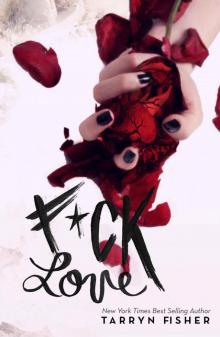 F*ck Love
F*ck Love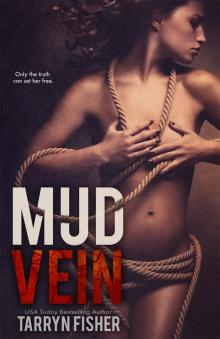 Mud Vein
Mud Vein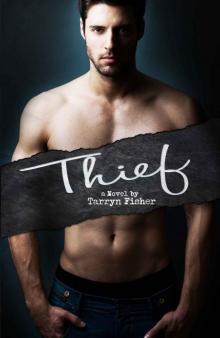 Thief
Thief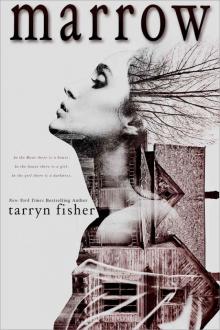 Marrow
Marrow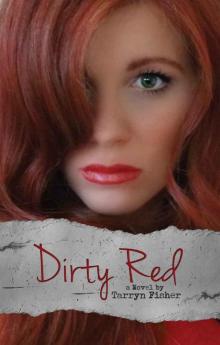 Dirty Red
Dirty Red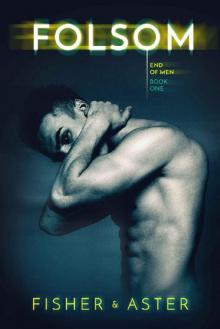 Folsom
Folsom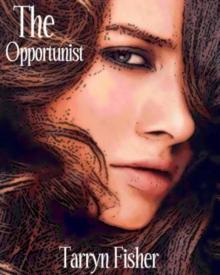 The Opportunist
The Opportunist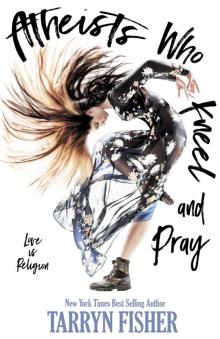 Atheists Who Kneel and Pray
Atheists Who Kneel and Pray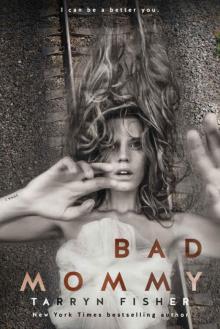 Bad Mommy
Bad Mommy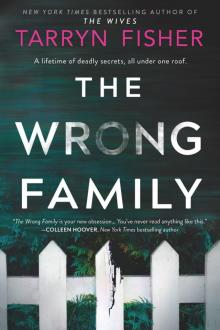 The Wrong Family
The Wrong Family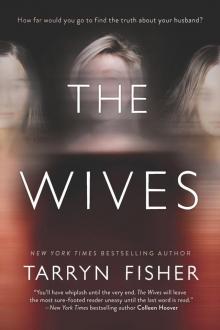 The Wives
The Wives Jackal (The End of Men Book 2)
Jackal (The End of Men Book 2)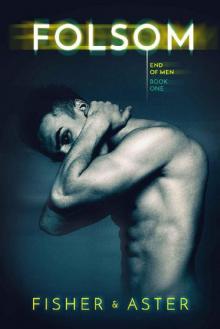 Folsom (The End of Men Book 1)
Folsom (The End of Men Book 1)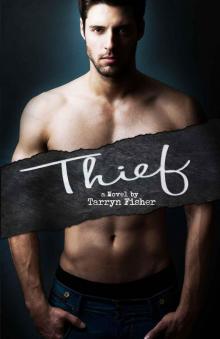 Thief (Love Me With Lies #3)
Thief (Love Me With Lies #3)